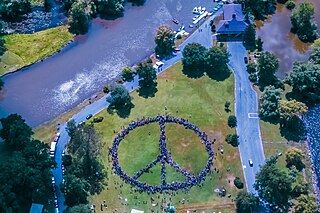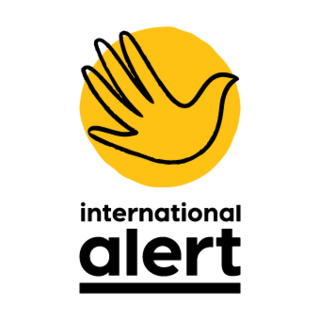
Peacekeeping comprises activities, especially military ones, intended to create conditions that favor lasting peace. Research generally finds that peacekeeping reduces civilian and battlefield deaths, as well as reduces the risk of renewed warfare.

Nonviolent Peaceforce (NP) is an international nongovernmental organization that employs Unarmed Civilian Protection. Their mission is to protect civilians in violent conflicts through unarmed strategies, build peace side-by-side with local communities, and advocate for the wider adoption of these approaches to safeguard human lives and dignity. NP holds Special Consultative Status with the Economic and Social Council of the United Nations, and has been endorsed by nine Nobel Peace Prize laureates, including the Dalai Lama and former South African Archbishop Desmond Tutu. In 2016, Nonviolent Peaceforce was nominated for a Nobel Peace Prize.
United Nations Security Council Resolution 1325 (S/RES/1325), on women, peace, and security, was adopted unanimously by the UN Security Council on 31 October 2000, after recalling resolutions 1261 (1999), 1265 (1999), 1296 (2000), and 1314 (2000). The resolution acknowledged the disproportionate and unique impact of armed conflict on women and girls. It calls for the adoption of a gender perspective to consider the special needs of women and girls during conflict, repatriation and resettlement, rehabilitation, reintegration, and post-conflict reconstruction.

The United Nations Mission in Liberia (UNMIL) was a United Nations peacekeeping operation established in September 2003 to monitor a ceasefire agreement in Liberia following the resignation of President Charles Taylor and the conclusion of the Second Liberian Civil War (1999–2003). At its peak it consisted of up to 15,000 UN military personnel and 1,115 police officers, along with civilian political advisors and aid workers.
Peaceworkers UK (PWUK) is part of the Peace-building Issues Programme of International Alert.
Kumar Rupesinghe was a Sri Lankan academic and activist involved in social issues, particularly human rights, development issues, processes of globalisation, conflict prevention/resolution, and conflict transformation in the light of peacekeeping and peacebuilding for a harmonious coexistence among all peoples in the world.

Peacebuilding is an activity that aims to resolve injustice in nonviolent ways and to transform the cultural and structural conditions that generate deadly or destructive conflict. It revolves around developing constructive personal, group, and political relationships across ethnic, religious, class, national, and racial boundaries. The process includes violence prevention; conflict management, resolution, or transformation; and post-conflict reconciliation or trauma healing before, during, and after any given case of violence.
The United Network of Young Peacebuilders (UNOY Peacebuilders) is a global network of young people and youth organisations active in the field of peacebuilding and conflict transformation. UNOY Peacebuilders was founded in 1989 and is working with youth mostly in violent conflict and post war regions. The core activities of UNOY Peacebuilders are capacity building as well as advocacy and campaigning.
The Public International Law & Policy Group (PILPG) is a non-profit organization, operating as a global pro bono law firm providing free legal assistance to developing states and sub-state entities involved in conflicts. PILPG also provides policy formulation advice and training on matters related to conflict resolution, including transitional justice, documentation of human rights violations, and community-level peacebuilding. To date, PILPG has advised over two dozen states and numerous civil society organizations on the legal aspects of peace negotiations and post-conflict constitution drafting. It has also advised numerous government and non-governmental actors in Europe, Asia and Africa about protecting human rights, prosecuting atrocity crimes, and rebuilding communities from the grassroots up.

MINUGUA was a United Nations humanitarian mission in Guatemala that involved, at the most critical point in the peace process, a three-month peacekeeping mission.
The United Nations Peacekeeping efforts began in 1948. Its first activity was in the Middle East to observe and maintain the ceasefire during the 1948 Arab–Israeli War. Since then, United Nations peacekeepers have taken part in a total of 72 missions around the globe, 12 of which continue today. The peacekeeping force as a whole received the Nobel Peace Prize in 1988.

Yōhei Sasakawa is chairman of The Nippon Foundation, the World Health Organization Goodwill Ambassador for Leprosy Elimination, and Japan's Ambassador for the Human Rights of People Affected by Leprosy. His global fight against leprosy and its accompanying stigma and social discrimination is an issue to which he has remained highly committed for more than 40 years. As chairman of The Nippon Foundation, Japan's largest charitable foundation, he guides public-interest activities in modern Japan. Sasakawa received his degree from Meiji University’s School of Political Science and Economics. Sasakawa's father was businessman, politician, and philanthropist Ryōichi Sasakawa.
The Mindanao Peoples Caucus (MPC) is a grassroots network of Indigenous Peoples, Bangsamoro and Christian communities and leaders who have common vision for peace in Mindanao. MPC is known to have stood up for the struggle to finally resolve the age-old armed conflict in Mindanao through a negotiated political settlement that contains the essentials acceptable to both negotiating parties and that addresses the historical oppression and forced marginalization of the native inhabitants and indigenous peoples of this island.

The Cambodian League for the Promotion and Defense of Human Rights, commonly known by its French acronym LICADHO, is a national Cambodian human rights non-governmental organization (NGO) established in 1992. It is based in Phnom Penh and also operates 12 provincial offices. LICADHO's activities focus on monitoring human rights violations, providing legal representation to victims of human rights abuses and providing humanitarian assistance to victims of human rights abuses. The organization also monitors 18 Cambodian prisons and has specialized programs for the protection of women's rights and children's rights. LICADHO is regularly cited in the Cambodian media for stories on local human rights issues. The organization has also received international coverage for its work to combat human trafficking and prisons, and has been particularly vocal in highlighting Cambodia's land-grabbing crisis since 2003. Current LICADHO director Naly Pilorge has authored a number of op-eds in major international media outlets publicizing the human rights situation in Cambodia. LICADHO was the sole Cambodian rights organization invited to testify at a 2013 US House of Representatives subcommittee hearing on Cambodia's "looming political and social crisis".
Colombia has been in the throes of civil unrest for over half a century. Between 1964 and now, 3 million persons have been displaced and about 220,000 have died, 4 out of 5 deaths were non-combatant civilians. Between left and right-winged armed forces, paramilitary and/or guerrilla, and an often corrupt government, it has been difficult for Colombia to set up any kind of truth or reconciliation commission. That is why the first on the scene, so to speak, were representatives of the UN. The Office of the United Nations High Commissioner for Human Rights has been present in Colombia since 1997. Since 2006 though, there has been another international movement turning its attention to Colombia; namely the International Center for Transitional Justice (ICTJ). The works of both of these institutions have led to a few semi-official national committees to oversee truth seeking missions in the hopes of eventually achieving reparation. In 2012, the Colombian government and the Revolutionary Armed Forces of Colombia (FARC) began their fourth attempt to negotiate an end to the fighting. Peace talks between the Colombian government of Juan Manuel Santos and the FARC, the main guerrilla force in the country, are currently underway in Havana, Cuba. The main issues are land redistribution, integration of the FARC into the political arena and an end to the powerful cocaine cartels. Though past attempts at peace talks have failed, negotiators in Havana, Cuba have gotten significantly further than ever before. Experts agree that it is not unreasonable to expect an accord by the end of 2014. In the words of President Santos: "Only in a Colombia without fear and with truth can we begin to turn the page."
The Colombian peace process is the peace process between the Colombian government of President Juan Manuel Santos and the Revolutionary Armed Forces of Colombia (FARC–EP) to bring an end to the Colombian conflict, which eventually led to the Peace Agreements between the Colombian Government of Juan Manuel Santos and FARC-EP. Negotiations began in September 2012, and mainly took place in Havana, Cuba. Negotiators announced a final agreement to end the conflict and build a lasting peace on August 24, 2016. However, a referendum to ratify the deal on October 2, 2016 was unsuccessful after 50.2% of voters voted against the agreement with 49.8% voting in favor. Afterward, the Colombian government and the FARC signed a revised peace deal on November 24 and sent it to Congress for ratification instead of conducting a second referendum. Both houses of Congress ratified the revised peace agreement on November 29–30, 2016, thus marking an end to the conflict.

International Alert is a global peacebuilding charity established in 1986, aiming to promote dialogue, training, research, policy analysis, advocacy, and outreach activities. The organization seeks to address the root causes of conflict, working with over 800 partner organization on projects to advance conflict resolution and support human rights. International Alert operates in Europe, Africa, Asia, the Middle East, Colombia, the Caucasus, and Ukraine.

The United Nations Observer Mission in Sierra Leone (UNOMSIL) was a United Nations peacekeeping operation in Sierra Leone from 1998 to 1999 that was established with the passage of United Nations Security Council Resolution 1181. Its mission was to monitor the military and security situation in Sierra Leone. The mission was terminated in October 1999, when the Security Council authorized deployment of a new, and significantly larger peacekeeping operation, the United Nations Mission in Sierra Leone (UNAMSIL).

Peace processes have taken place during several phases of the Afghanistan conflict, which has lasted since the 1978 Saur Revolution.
The First Liberian Civil War began in 1989, when Charles Taylor 's National Patriotic Front of Liberia (NPFL) forces invaded the country in rebellion against the regime of Samuel Doe, who came to power through the 1980 Liberian coup d'état. Liberians United for Reconciliation and Democracy (LURD), Movement for Democracy in Liberia (MODEL), the United Liberation Movement for Democracy (ULIMO), as well as the NPFL utilized children as an integral aspect of their forces over the course of both armed conflicts, organizing them into factions such as the Small Boys Unit. The First Liberian Civil War as well as the Second Liberian Civil War saw thousands of children were forced to participate in armed conflict, resulting in an estimated figure of 21,000 child soldiers in need of demobilization, rehabilitation, and reintegration following the end of the Second Liberian Civil War in 2003, which concluded with the signage of the Comprehensive Peace Agreement. In the years following the war, the Liberian government was implemented measures to promote their international and national commitment to reintegrating and supporting former Children in the military.







